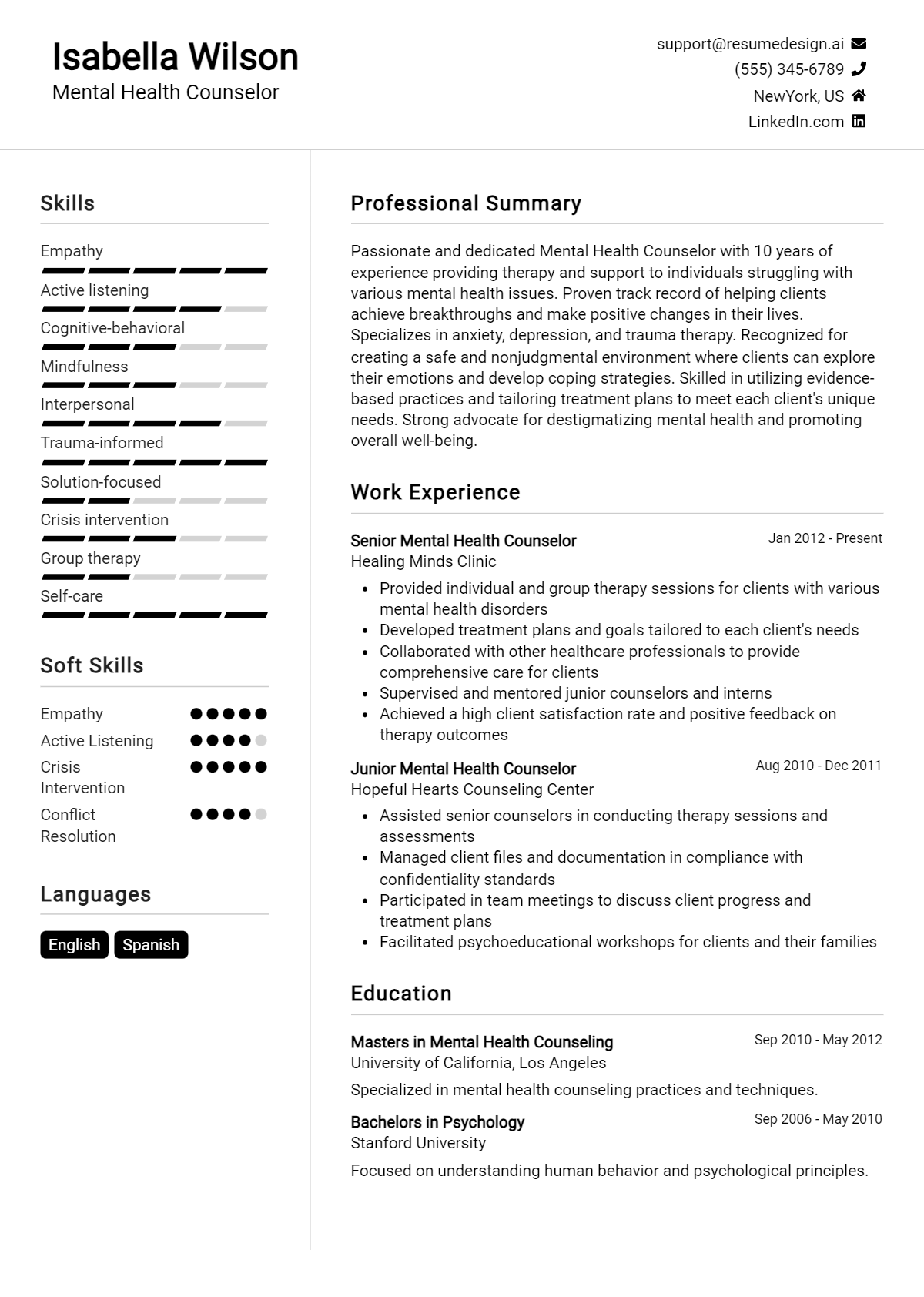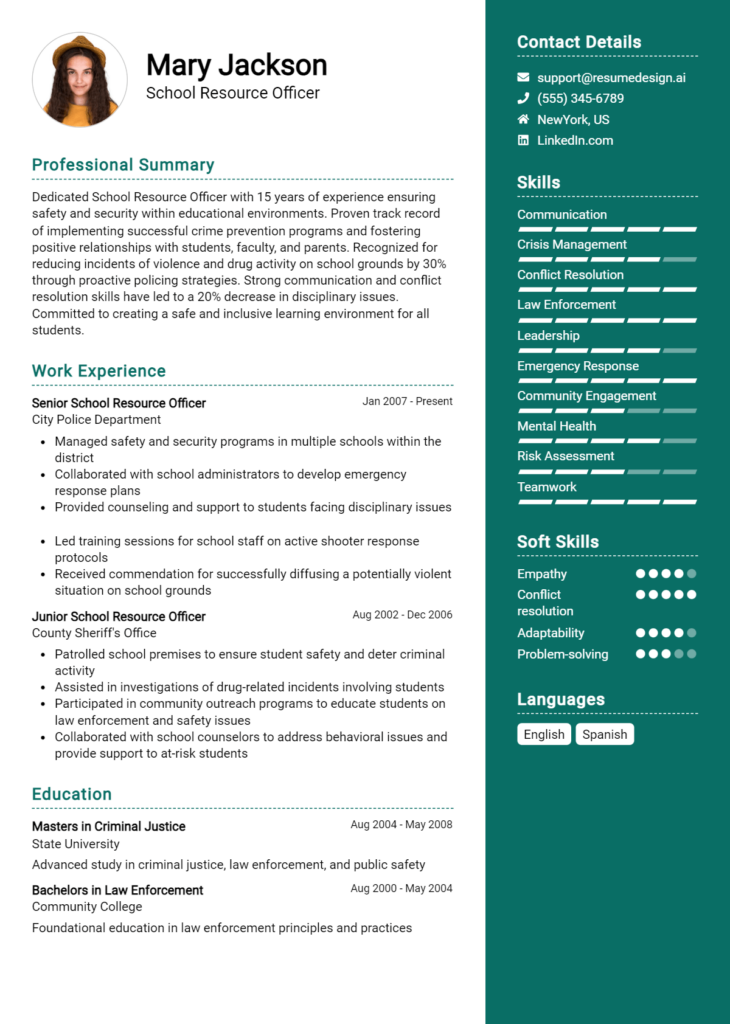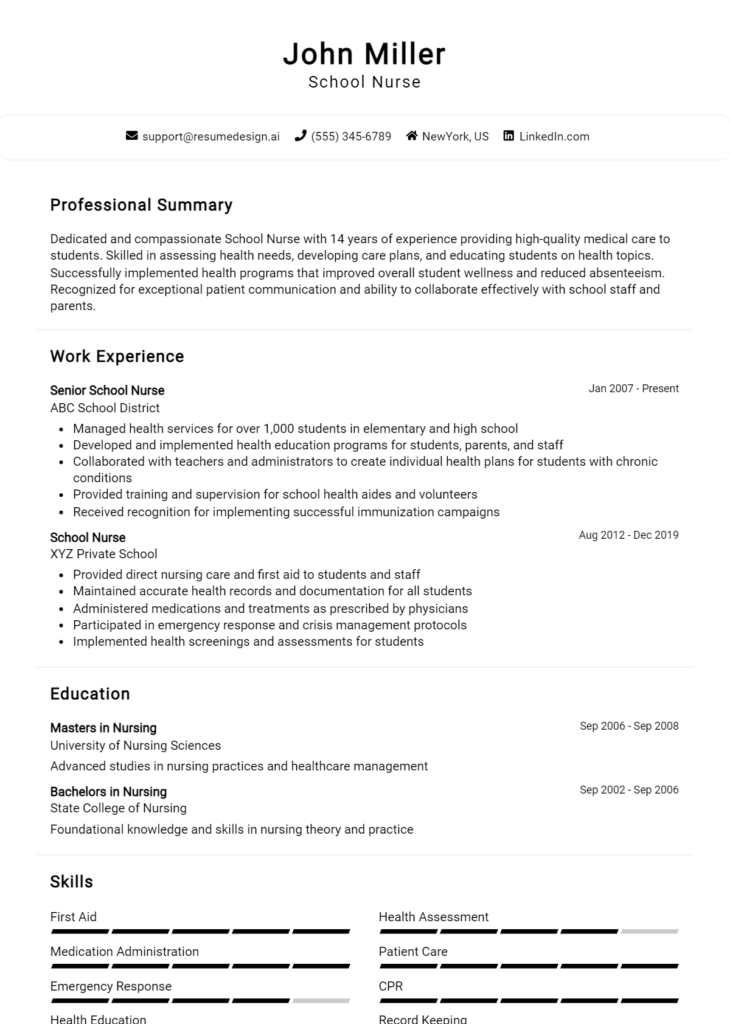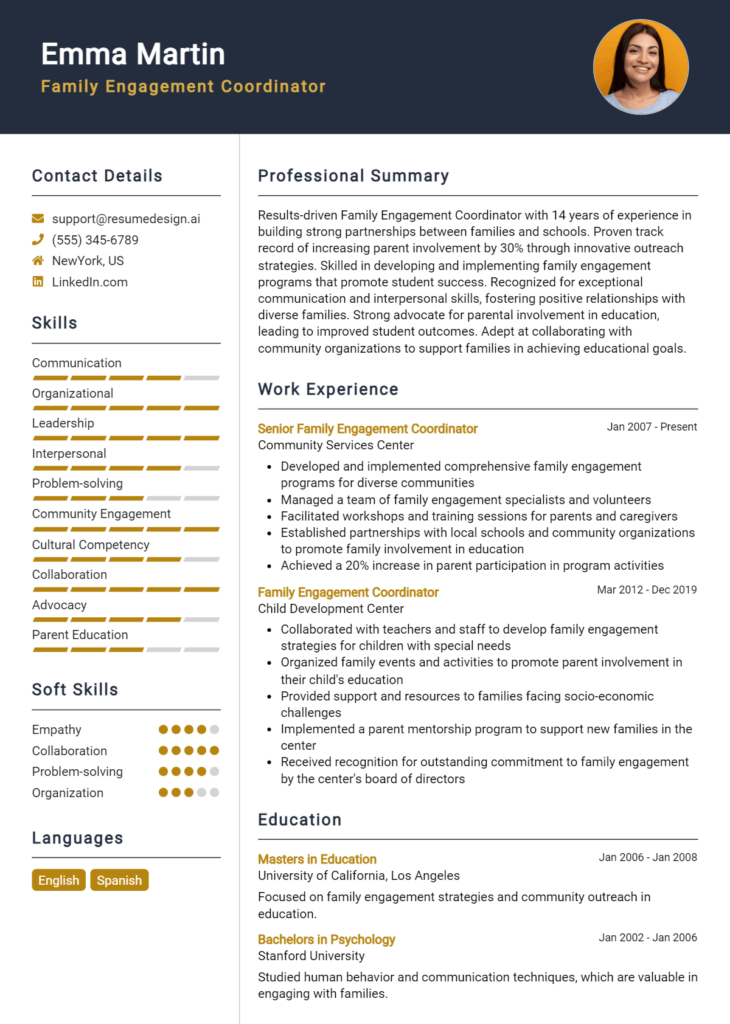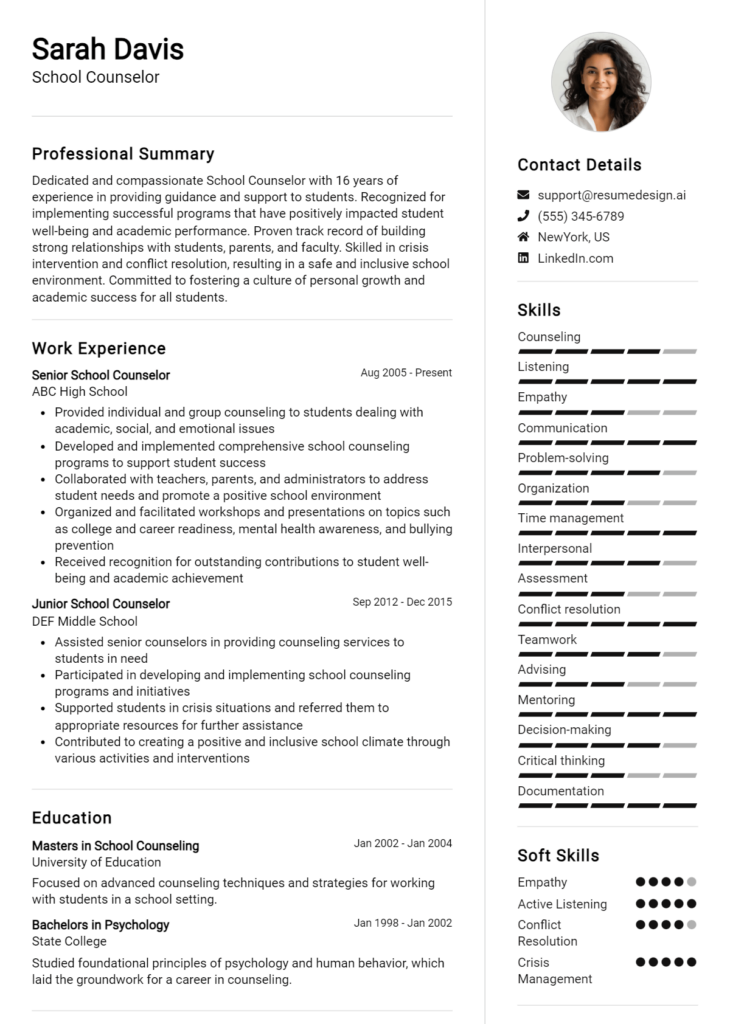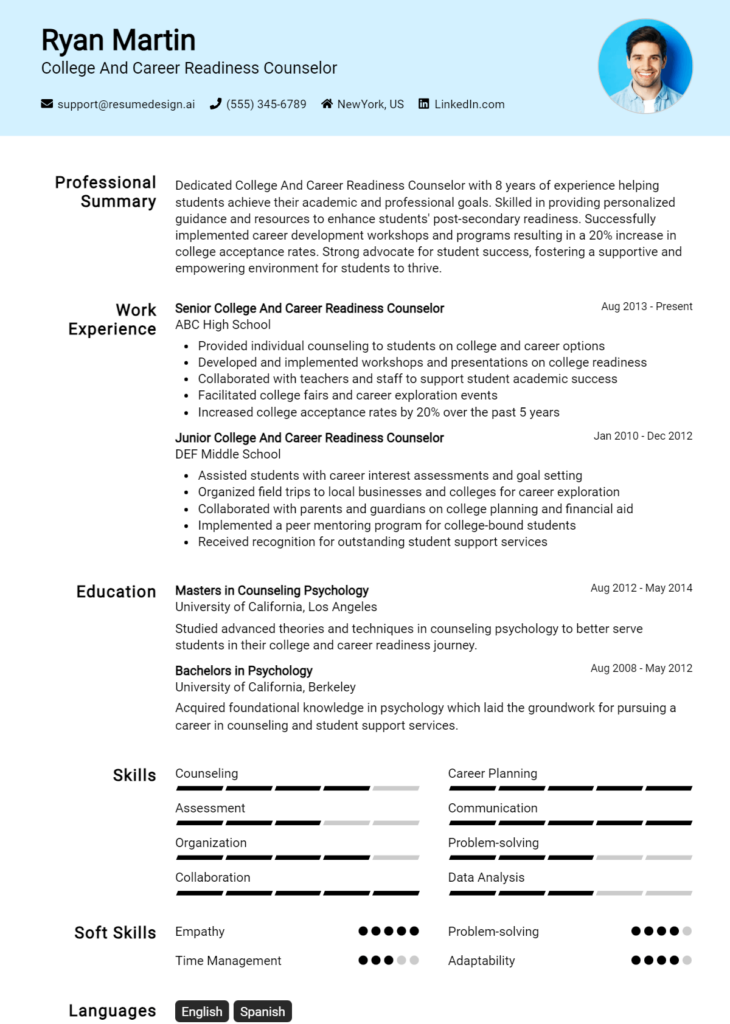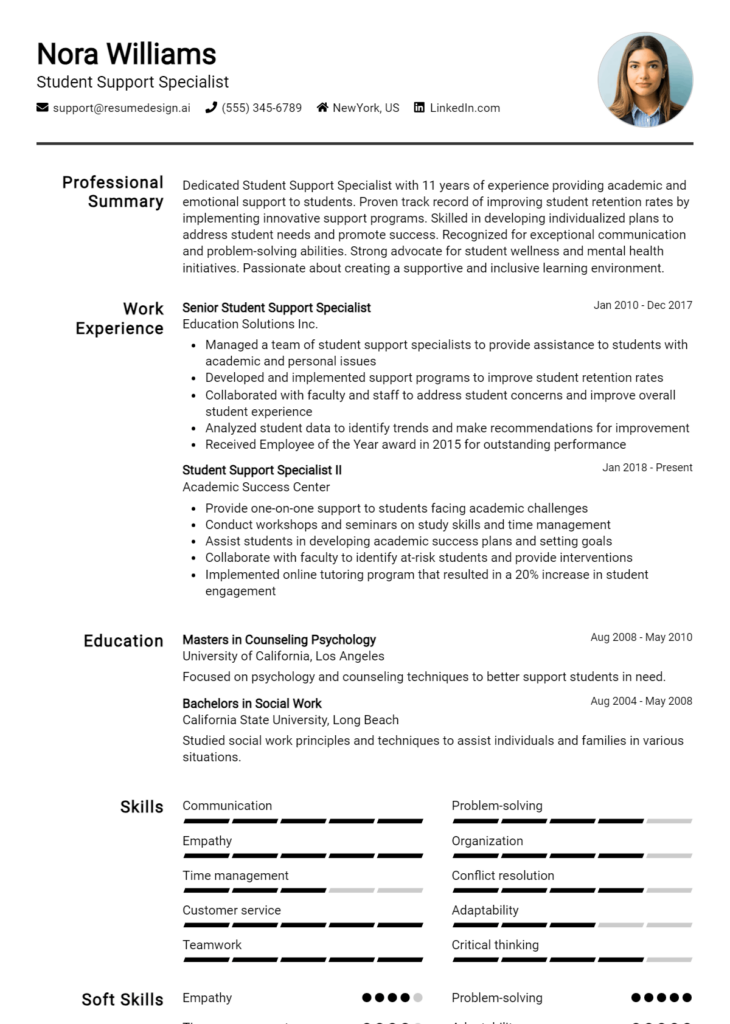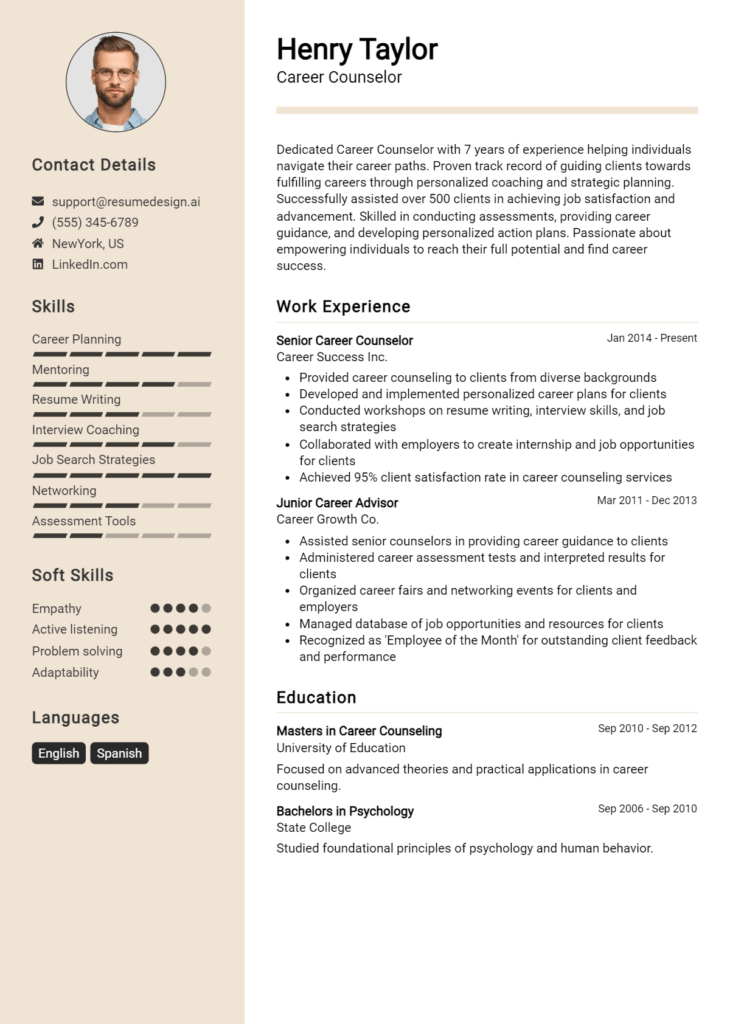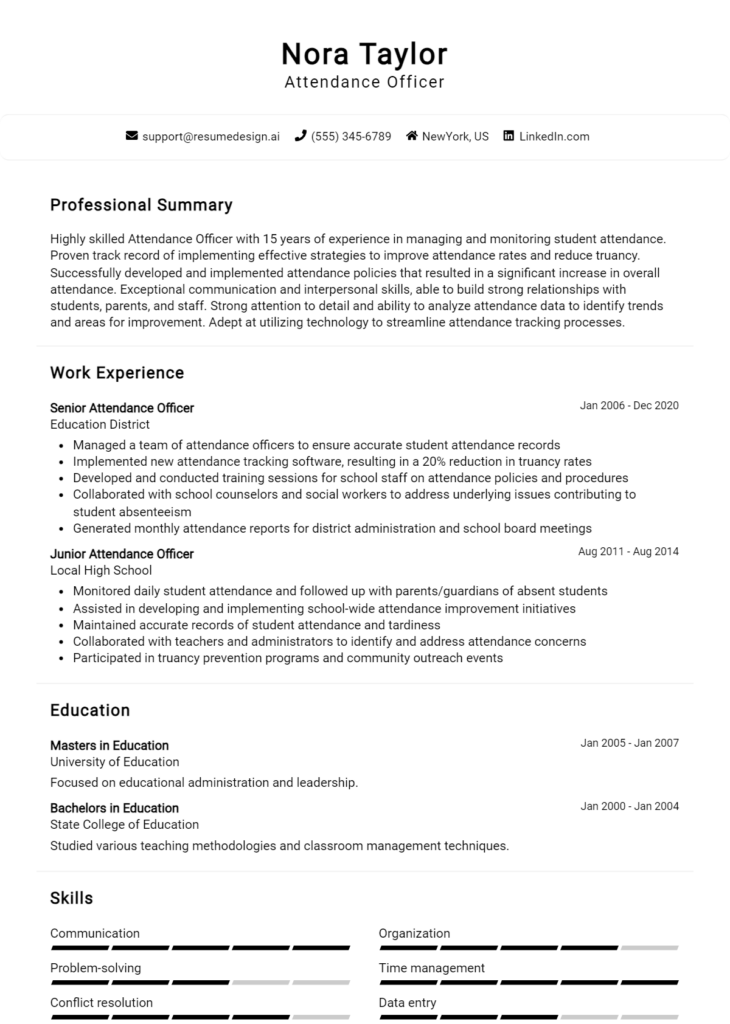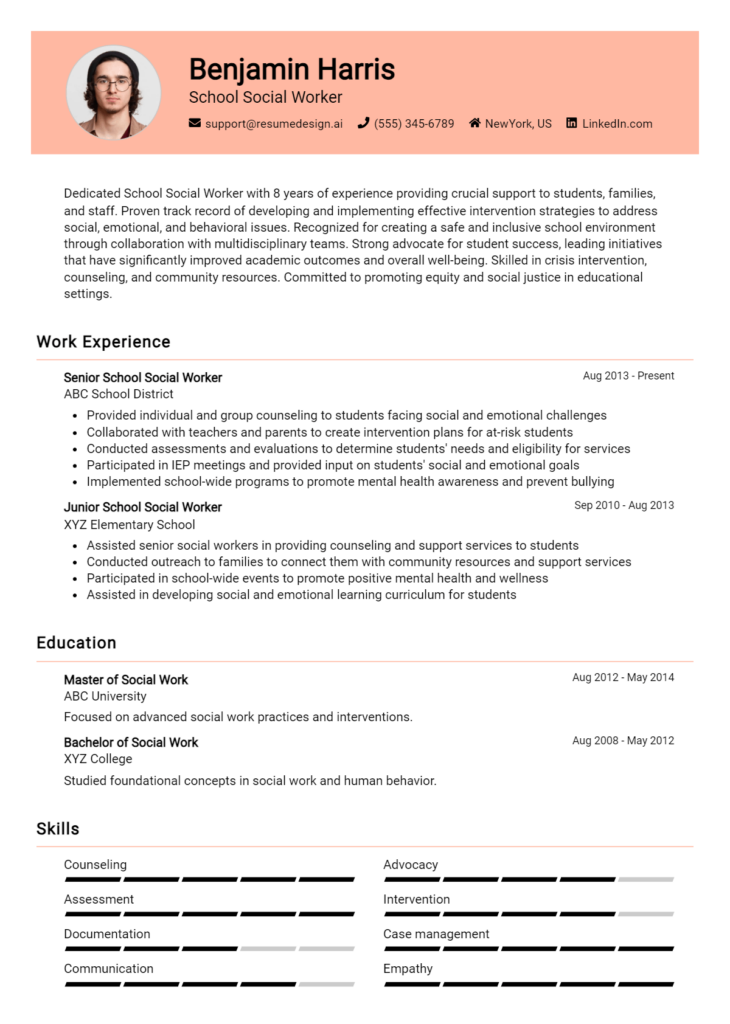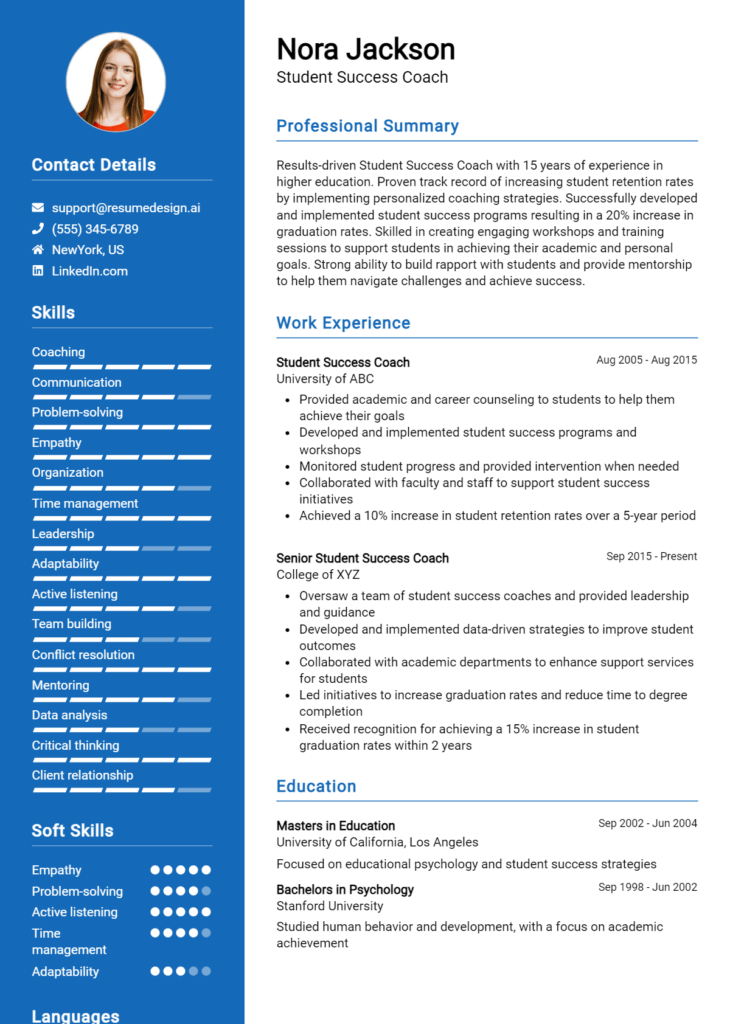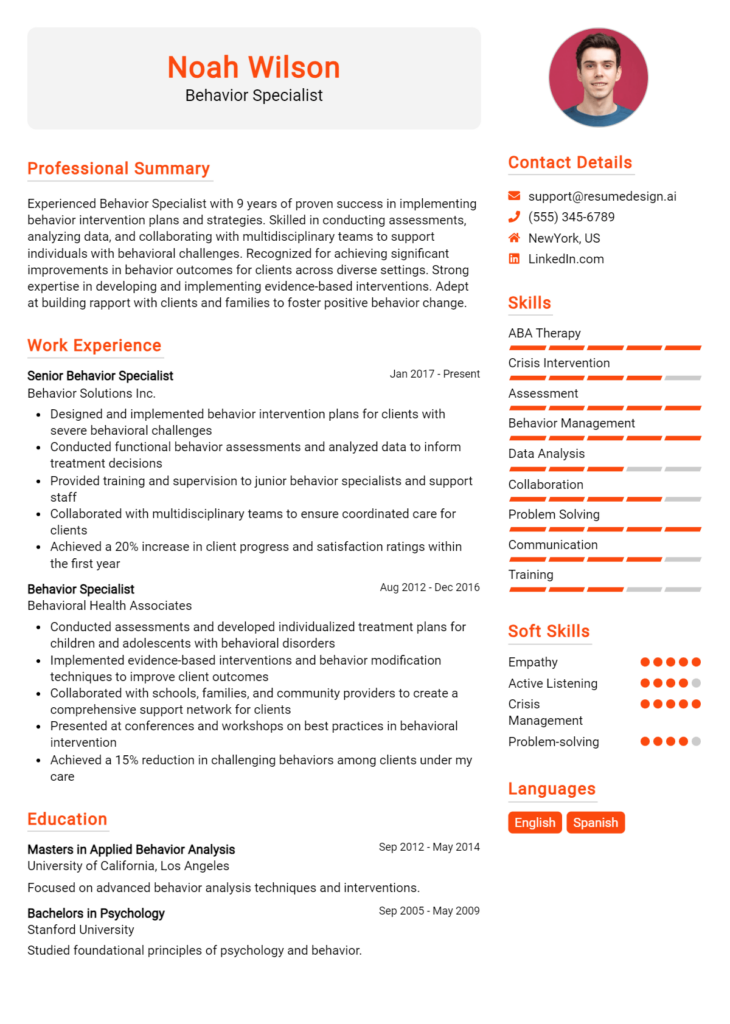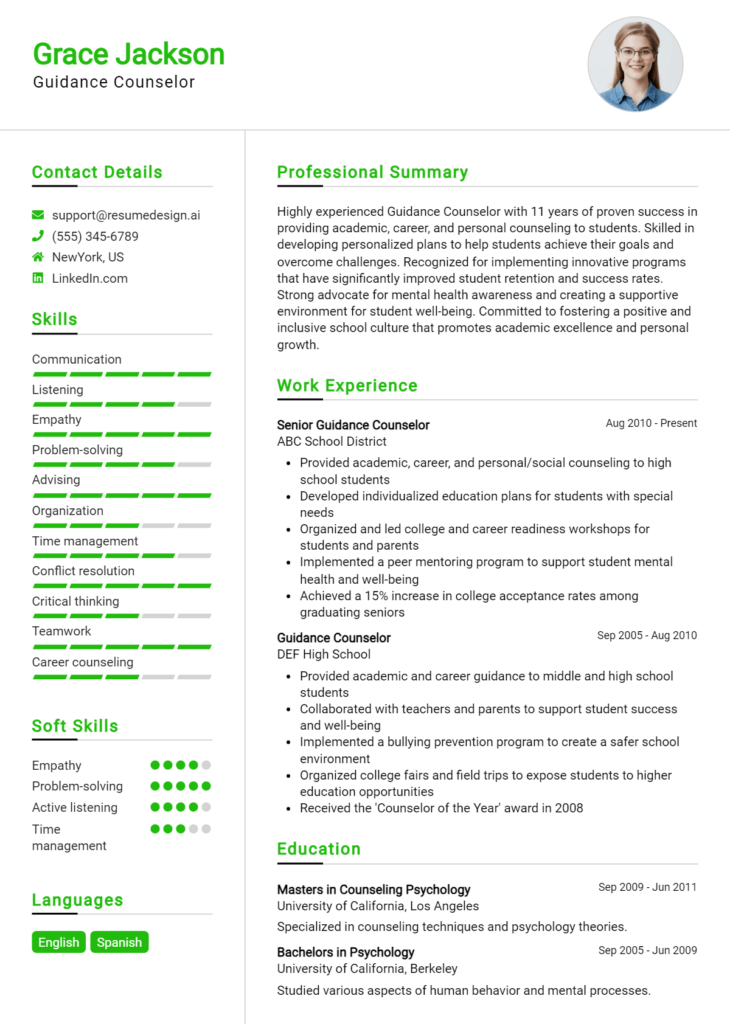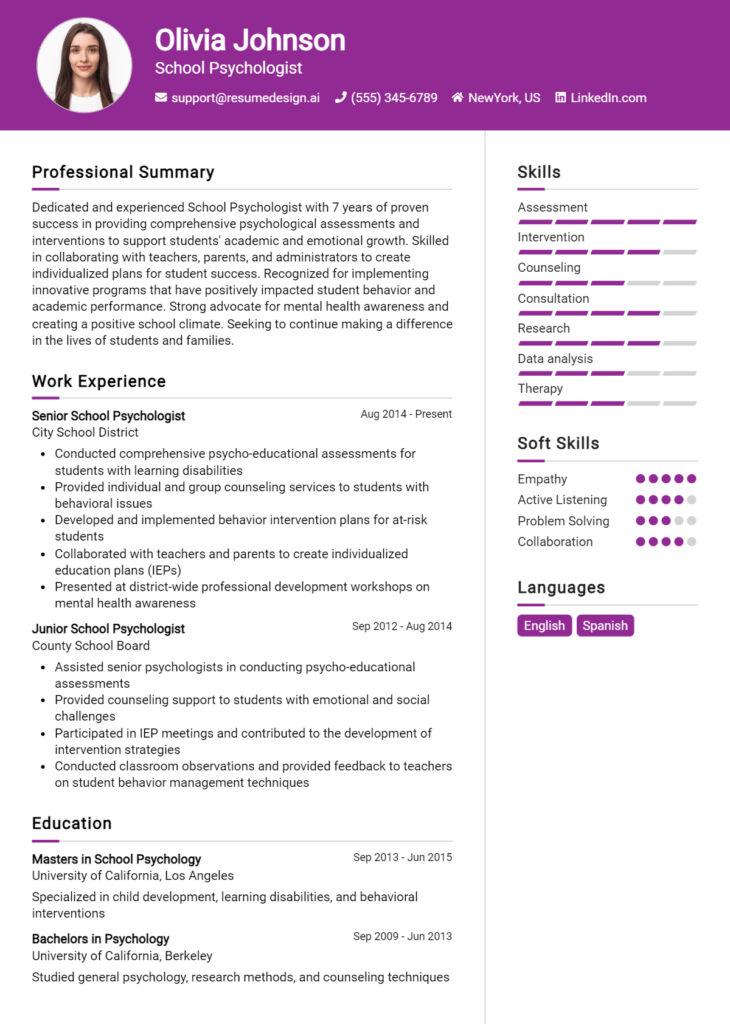Mental Health Counselor Core Responsibilities
Mental Health Counselors play a pivotal role in supporting clients' emotional well-being by conducting assessments, developing treatment plans, and facilitating therapy sessions. They collaborate with various departments, such as healthcare providers and community services, to ensure holistic care. Essential skills include strong communication, empathy, and problem-solving abilities, which are vital for addressing complex mental health issues. These competencies enhance the organization's mission of promoting mental health, making a well-structured resume crucial for highlighting relevant qualifications.
Common Responsibilities Listed on Mental Health Counselor Resume
- Conducting comprehensive psychological assessments and evaluations.
- Developing personalized treatment plans based on client needs.
- Facilitating individual and group therapy sessions.
- Maintaining accurate and confidential client records.
- Collaborating with other healthcare professionals and departments.
- Providing crisis intervention and support.
- Educating clients and families about mental health issues.
- Monitoring client progress and adjusting treatment plans as necessary.
- Staying updated on best practices and emerging therapies.
- Advocating for clients' needs within the community.
- Participating in staff training and professional development opportunities.
High-Level Resume Tips for Mental Health Counselor Professionals
A well-crafted resume is a crucial tool for Mental Health Counselor professionals, often serving as the first impression a candidate makes on potential employers. In a field where empathy, expertise, and the ability to connect with clients are paramount, your resume must reflect not only your skills and achievements but also your passion for mental health. A strong resume can set you apart from the competition, showcasing your unique qualifications and making a compelling case for your candidacy. This guide will provide practical and actionable resume tips specifically tailored for Mental Health Counselor professionals, helping you to create a document that resonates with hiring managers and highlights your strengths.
Top Resume Tips for Mental Health Counselor Professionals
- Tailor your resume to the specific job description by using keywords and phrases found in the posting.
- Highlight relevant experience, such as internships, volunteer work, or positions in mental health settings.
- Quantify your achievements whenever possible, such as the number of clients served or improvements in client outcomes.
- Showcase industry-specific skills, including crisis intervention, therapeutic techniques, and assessment capabilities.
- Include relevant certifications and licenses, such as LPC, LCSW, or NCC, prominently on your resume.
- Utilize a clear and professional format that enhances readability and emphasizes key information.
- Incorporate testimonials or quotes from supervisors or clients to add credibility to your accomplishments.
- Focus on continuous professional development by listing workshops, trainings, or conferences attended.
- Emphasize soft skills like communication, empathy, and cultural competency that are essential in counseling.
- Keep your resume concise, ideally one page, while ensuring all relevant information is included.
By implementing these tips, you can significantly increase your chances of landing a job in the Mental Health Counselor field. A polished and targeted resume not only showcases your qualifications but also demonstrates your commitment to the profession, making you a more attractive candidate in a competitive job market.
Writing an Exceptional Mental Health Counselor Resume Summary
A resume summary is a crucial component for a Mental Health Counselor's job application, as it serves as a powerful introduction that can quickly capture the attention of hiring managers. In a competitive job market, a well-crafted summary highlights key skills, relevant experience, and noteworthy accomplishments, painting a concise yet impactful picture of the candidate's qualifications. Tailored specifically to the job being applied for, a strong summary not only reflects the candidate's understanding of the role but also demonstrates their commitment to providing exceptional mental health care.
Best Practices for Writing a Mental Health Counselor Resume Summary
- Quantify achievements where possible, such as the number of clients served or improvement rates.
- Focus on relevant skills, including specific therapeutic techniques and counseling methodologies.
- Tailor the summary to match the job description, using keywords and phrases from the posting.
- Keep it concise, ideally between 3-5 sentences, to maintain the reader's interest.
- Highlight certifications and special training that are pertinent to the role.
- Showcase your passion for mental health and dedication to client success.
- Use active language to convey confidence and competence in your abilities.
- Avoid jargon and overly complex terms that may confuse the reader.
Example Mental Health Counselor Resume Summaries
Strong Resume Summaries
Compassionate Mental Health Counselor with over 6 years of experience providing therapeutic support to diverse populations. Successfully implemented evidence-based treatment plans that resulted in a 75% improvement in client mental health outcomes. Licensed in Cognitive Behavioral Therapy and dedicated to fostering a safe and inclusive environment for all clients.
Results-driven Mental Health Counselor with a proven track record of managing a caseload of 30+ clients while coordinating with interdisciplinary teams. Achieved a 90% client satisfaction rate through tailored counseling techniques and consistent follow-up. Certified in trauma-informed care, ensuring sensitive handling of client issues.
Dynamic Mental Health Counselor with expertise in adolescent therapy and family counseling. Developed and led workshops that increased community awareness of mental health issues by 40%. Passionate about advocacy and mental health education, with a strong commitment to client empowerment.
Weak Resume Summaries
Mental Health Counselor with experience in the field. I help people with their problems and have worked with various clients.
Dedicated professional looking for a counseling position. I have some skills and knowledge in mental health and want to support clients.
The examples provided illustrate the distinction between strong and weak resume summaries effectively. Strong summaries are specific, quantifiable, and directly relevant to the Mental Health Counselor role, showcasing the candidate's experience and successes. In contrast, weak summaries lack detail, providing generic statements that do not highlight any particular skills or achievements, ultimately failing to engage the hiring manager's interest.
Work Experience Section for Mental Health Counselor Resume
The work experience section of a Mental Health Counselor resume is crucial as it provides a comprehensive view of the candidate’s professional journey, showcasing their technical skills, teamwork capabilities, and commitment to delivering high-quality mental health services. This section not only highlights relevant experiences but also emphasizes the impact the candidate has made in previous roles through quantifiable achievements. Aligning these experiences with industry standards is essential, as it demonstrates the candidate's understanding of best practices in mental health counseling and their ability to contribute effectively in a professional setting.
Best Practices for Mental Health Counselor Work Experience
- Clearly articulate your technical expertise in counseling methods and therapeutic techniques.
- Quantify your achievements with specific metrics, such as percentage improvements in client outcomes.
- Highlight collaborative efforts with multidisciplinary teams to showcase teamwork and communication skills.
- Use action verbs to describe your responsibilities and contributions to make your experience more dynamic.
- Tailor your work experience to align with the requirements of the job you are applying for.
- Incorporate relevant certifications or training that enhance your qualifications.
- Focus on case studies or specific projects where you made a significant impact.
- Maintain a professional tone and ensure clarity in describing your roles and responsibilities.
Example Work Experiences for Mental Health Counselor
Strong Experiences
- Implemented a new cognitive behavioral therapy program that improved patient satisfaction scores by 30% within six months.
- Collaborated with a team of psychiatrists and social workers to create an integrated care plan, resulting in a 25% decrease in hospital readmission rates.
- Led group therapy sessions for adolescents, successfully increasing engagement levels by 40%, as measured by participation metrics.
- Trained and mentored junior counselors, enhancing team performance and contributing to a 15% improvement in overall client outcomes.
Weak Experiences
- Assisted in counseling sessions and helped clients.
- Participated in team meetings and discussed client cases.
- Worked with patients on various issues and provided support.
- Helped improve client satisfaction through various methods.
The experiences categorized as strong are characterized by their specificity and quantifiable outcomes, demonstrating the candidate's direct impact on client care and program effectiveness. In contrast, the weak experiences lack detail and measurable achievements, making it difficult for potential employers to gauge the candidate's contributions and capabilities. By focusing on clear, impactful statements, candidates can significantly enhance their resumes.
Education and Certifications Section for Mental Health Counselor Resume
The education and certifications section of a Mental Health Counselor resume is crucial in establishing the candidate's qualifications and expertise in the field. This section not only showcases the individual's academic background but also highlights their commitment to continuous learning and professional development through industry-relevant certifications. By providing relevant coursework, specialized training, and recognized credentials, candidates can significantly enhance their credibility and demonstrate alignment with the job role, making them more attractive to potential employers.
Best Practices for Mental Health Counselor Education and Certifications
- List degrees in psychology, counseling, or social work prominently to establish foundational knowledge.
- Include relevant certifications such as Licensed Professional Counselor (LPC) or National Certified Counselor (NCC).
- Highlight specialized training in areas like trauma-informed care, cognitive-behavioral therapy, or substance abuse counseling.
- Provide details about any continuing education courses that reflect ongoing professional development.
- Be specific about the institutions attended and the dates of graduation or certification completion.
- Utilize bullet points for clarity and easy readability, focusing on the most relevant information.
- Incorporate any honors or distinctions received during education or certification programs.
- Tailor the information to align with the job description, emphasizing qualifications that meet the employer's needs.
Example Education and Certifications for Mental Health Counselor
Strong Examples
- M.A. in Clinical Psychology, University of XYZ, Graduated May 2020
- Licensed Professional Counselor (LPC), State of ABC, License #123456
- Certified Trauma Specialist, Trauma Institute, Certification #78910
- Completed coursework in Cognitive Behavioral Therapy, University of XYZ, Fall 2019
Weak Examples
- Bachelor of Arts in English Literature, University of ABC, Graduated May 2010
- Certification in Basic First Aid, Red Cross, Expires March 2022
- Online Course in Public Speaking, Coursera, Completed January 2021
- High School Diploma, XYZ High School, Graduated June 2005
The examples listed as strong are considered effective because they directly relate to the qualifications necessary for a Mental Health Counselor role, demonstrating relevant education, recognized certifications, and specialized training that enhance the candidate's attractiveness to employers. Conversely, the weak examples lack relevance to the mental health field, with outdated or unrelated qualifications that do not contribute to the candidate's professional credibility in counseling.
Top Skills & Keywords for Mental Health Counselor Resume
As a Mental Health Counselor, the importance of showcasing relevant skills in your resume cannot be overstated. These skills not only highlight your qualifications but also demonstrate your ability to effectively support and guide clients through their mental health journeys. Employers seek candidates who possess a blend of both hard and soft skills, as they are crucial in establishing trust, empathy, and an effective therapeutic alliance with clients. A well-rounded skill set can enhance your resume, making you a more attractive candidate for potential employers in the mental health field. For a deeper understanding of how to effectively present your skills and work experience, consider exploring additional resources.
Top Hard & Soft Skills for Mental Health Counselor
Soft Skills
- Empathy
- Active Listening
- Communication Skills
- Interpersonal Skills
- Problem-Solving
- Patience
- Adaptability
- Cultural Competence
- Conflict Resolution
- Team Collaboration
- Ethical Judgment
- Time Management
- Motivation and Encouragement
- Stress Management
- Compassion
- Resilience
- Critical Thinking
Hard Skills
- Knowledge of Mental Health Disorders
- Crisis Intervention Techniques
- Therapeutic Techniques (e.g., CBT, DBT)
- Assessment and Diagnosis
- Treatment Planning
- Record Keeping and Documentation
- Familiarity with DSM-5
- Familiarity with HIPAA Regulations
- Group Therapy Facilitation
- Client Case Management
- Research and Evaluation Skills
- Knowledge of Psychopharmacology
- Data Analysis for Treatment Effectiveness
- Familiarity with Telehealth Platforms
- Development of Treatment Strategies
- Networking with Community Resources
- Program Development and Evaluation
Stand Out with a Winning Mental Health Counselor Cover Letter
Dear [Hiring Manager's Name],
I am writing to express my interest in the Mental Health Counselor position at [Company/Organization Name], as advertised on [where you found the job posting]. With a Master’s degree in Clinical Psychology and over five years of experience in providing therapeutic interventions to diverse populations, I am confident in my ability to contribute effectively to your team. My passion for mental health advocacy and my commitment to fostering a supportive environment for clients align closely with the values of [Company/Organization Name].
Throughout my career, I have had the privilege of working in various settings, including community clinics and private practice, where I developed strong skills in individual and group counseling, crisis intervention, and behavioral health assessment. Through my approach, I prioritize building trust and rapport with clients, allowing them to feel safe and supported in their journey toward mental wellness. My experience has equipped me to utilize evidence-based practices tailored to clients' unique needs, ensuring that each individual receives personalized care.
In my previous role at [Previous Employer], I successfully implemented a new group therapy program that resulted in a 30% increase in client engagement and retention. This initiative not only improved access to mental health services but also fostered a sense of community among participants. I am excited about the possibility of bringing my innovative strategies and collaborative spirit to [Company/Organization Name], where I believe my skills can make a meaningful impact on the lives of your clients.
I look forward to the opportunity to discuss how my experience and passion for mental health can contribute to the exceptional care provided at [Company/Organization Name]. Thank you for considering my application. I hope to speak with you soon.
Sincerely,
[Your Name]
[Your Contact Information]
[LinkedIn Profile or Website, if applicable]
Common Mistakes to Avoid in a Mental Health Counselor Resume
A well-crafted resume is crucial for any Mental Health Counselor aiming to stand out in a competitive job market. However, many candidates make common mistakes that can hinder their chances of landing an interview. By being aware of these pitfalls, you can enhance your resume and present your qualifications more effectively. Here are some frequent errors to avoid:
Generic Objective Statement: Using a vague or generic objective doesn’t capture the attention of hiring managers. Tailor your statement to reflect your specific goals and how they align with the position you’re applying for.
Overloading with Jargon: While it’s important to demonstrate your expertise, overloading your resume with industry jargon can alienate readers. Use clear and accessible language to ensure your qualifications are easily understood.
Neglecting Soft Skills: Counseling requires a unique set of soft skills, such as empathy and communication. Failing to highlight these can make your resume less appealing. Showcase your interpersonal skills alongside your clinical expertise.
Inconsistent Formatting: A cluttered or inconsistent format can make your resume hard to read. Use a clean, professional layout with uniform fonts and bullet points to enhance readability.
Omitting Relevant Experience: Some candidates may overlook including volunteer work or internships that demonstrate their counseling abilities. Every relevant experience counts, so be sure to include all pertinent roles, even if they were unpaid.
Using Passive Language: Passive language can make your accomplishments sound less impactful. Use active verbs to describe your responsibilities and achievements, which conveys confidence and proactivity.
Ignoring Keywords from Job Descriptions: Many employers use applicant tracking systems (ATS) to screen resumes. Failing to incorporate relevant keywords from the job description can result in your resume being overlooked.
Lengthy Descriptions: Lengthy job descriptions can dilute the impact of your achievements. Keep each entry concise and focused on the most relevant and impressive aspects of your experience to maintain the reader’s interest.
Conclusion
As a Mental Health Counselor, your resume is a crucial tool in showcasing your skills, experience, and dedication to supporting individuals' mental well-being. Throughout this article, we've emphasized the importance of highlighting specific qualifications, such as your educational background, relevant certifications, and any specialized training you may have undergone. Additionally, showcasing your interpersonal skills and empathy is vital, as these attributes are central to effective counseling.
We also discussed the significance of tailoring your resume to the job you’re applying for, ensuring that you align your experiences with the requirements of the role. Using action verbs and quantifying your achievements can further bolster your application, making it stand out to potential employers.
Now is the perfect time to review your Mental Health Counselor resume. Ensure that it reflects your best self and adequately represents your qualifications. To assist you in this process, a variety of resources are available to help you create a compelling resume:
- Explore resume templates designed specifically for mental health professionals.
- Utilize the resume builder to streamline the creation of your resume.
- Check out resume examples to gain inspiration from others in your field.
- Don’t forget to craft a strong first impression with cover letter templates that complement your resume.
Take action today and enhance your resume to reflect your unique qualifications as a Mental Health Counselor!

